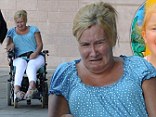- Researchers also found toddlers throw far fewer temper tantrums than expected
- Fewer than one in ten have a daily tantrum
- Questionnaire contains 118 questions, but researchers home to develop 'home' version with 25
By
Mark Prigg
17:28 GMT, 30 August 2012
|
17:36 GMT, 30 August 2012
Scientists have revealed a simple series of questions that can warn parents if their toddler's tantrum are early signs of mental health problems.
The team from Northwestern University
say the new tool will help prevent rampant mislabelling and
overtreatment of typical naughtiness.

Despite toddlers¿ reputation, fewer than one in ten have a daily tantrum, new research at northwestern University has revealed.
Professor
Lauren Wakschlag, of Northwestern University in the United States,
said: 'It gives a measurable indicator to tell us when tantrums are
frequent enough that a child may be struggling.
'Perhaps
for the first time, we have a tangible way to help parents, doctors and
teachers know when the frequency and type of tantrums may be an
indication of a deeper problem.'
In the study researchers asked parents of almost 1,500 three to five year olds about their child’s behaviour including the frequency, quality and severity of temper tantrums over the past month.
Early childhood is a critical period to identify a problem because once they become entrenched, they are harder to treat.
Prof Wakschlag said: 'We have defined the small facets of temper tantrums as they are expressed in early childhood.
'This is key to our ability to tell the difference between a typical temper tantrum and one that is problematic.'
The questionnaire is now 118 questions but researchers hope to use state-of-the-art measurement science to crunch it down to about 25 key questions.
An ultimate goal of the research team is to create a form for parents to fill out in pediatric waiting rooms, with the computer generating immediate feedback to pediatricians prior to the appointment.
The study found a typical tantrum may occur when a child is tired or frustrated or during daily routines such as at bedtime, mealtime or getting dressed.

It is hoped the new questionnaire could help researchers to spot children with potential problems early enough to improve treatments.
However, unusual ones may occur 'out of the blue' or be so intense a child becomes exhausted.
When these happen regularly, they become a red flag for concern.
The commonly used Diagnostic and Statistical Manual of Mental Disorders (DSM) does not provide age-specific markers for determining clinical significance.
For example, a symptom of behaviour problems in DSM is defined as 'often loses temper.'
Prof Wakschlag said: 'The definition of ‘often’ may vary substantially for younger and older children and depend on family stress levels and other mitigating factors.
'Since most preschool children have tantrums, this vague criteria makes it exceptionally difficult for providers to determine when behaviour is of clinical significance in early childhood.
'There’s been a real danger of preschool children with normal misbehaviour being mislabelled and over-treated with medication.
'On the other hand, paediatricians are hampered by the lack of standardised methods for determining when misbehaviour reflects deeper problems and so may miss behaviours that are concerning.
'This is why it is so crucial to have tools that precisely identify when worry is warranted in this age group.'
The researchers admitted they were surprised by how few tantrums they found.
Despite toddlers’ reputation, fewer than one in ten have a daily tantrum, new research has revealed.
Scientists investigating whether
temper tantrums in pre-school children were early markers for mental
health problems made the surprise discovery.
They assumed from common knowledge that children had far more tantrums than their research actually revealed.
They have now been able to develop a
simple questionnaire which can identify young children whose temper
tantrums are the early signs of mental health problems.
The findings were published in The Journal of Child Psychology and Psychiatry.
-
 London 2012 welcomes the Paralympics back home: Remarkable...
London 2012 welcomes the Paralympics back home: Remarkable...
-
 A university professor and the street of cars scratched with...
A university professor and the street of cars scratched with...
-
 British Bake Off's viewers keep on rising... thanks to the...
British Bake Off's viewers keep on rising... thanks to the...
-
 Couple discover 33ft deep medieval WELL beneath their living...
Couple discover 33ft deep medieval WELL beneath their living...
-
 They really are the Superhumans: Ukraine swimmer finishes...
They really are the Superhumans: Ukraine swimmer finishes...
-
 Caught on camera, dementia patient's abuse by care staff:...
Caught on camera, dementia patient's abuse by care staff:...
-
 'Apparently the Saudi Arabian Paralympic team is mainly...
'Apparently the Saudi Arabian Paralympic team is mainly...
-
 Gay couple sues airline after 'baggage handlers took dildo...
Gay couple sues airline after 'baggage handlers took dildo...
-
 Nurse who stabbed her daughter, 4, to death and tried to...
Nurse who stabbed her daughter, 4, to death and tried to...
-
 One in four babies delivered in England and Wales hospitals...
One in four babies delivered in England and Wales hospitals...
-
 Captain hero! Simon Cowell rescues nine passengers from...
Captain hero! Simon Cowell rescues nine passengers from...
-
 'Nice, sell cars off the back of the national anthem':...
'Nice, sell cars off the back of the national anthem':...